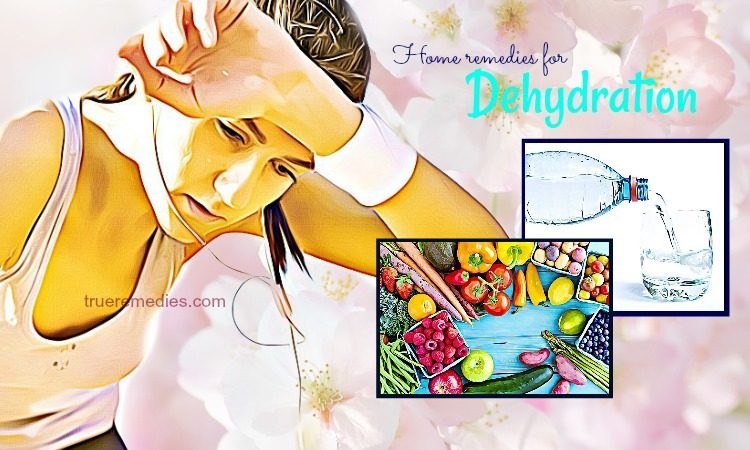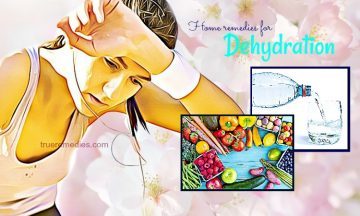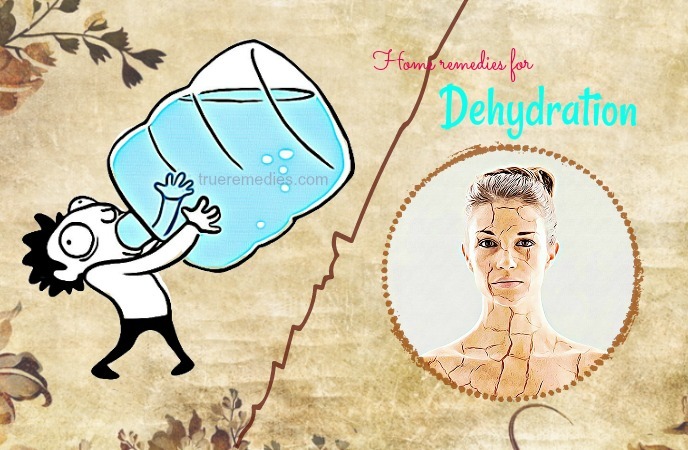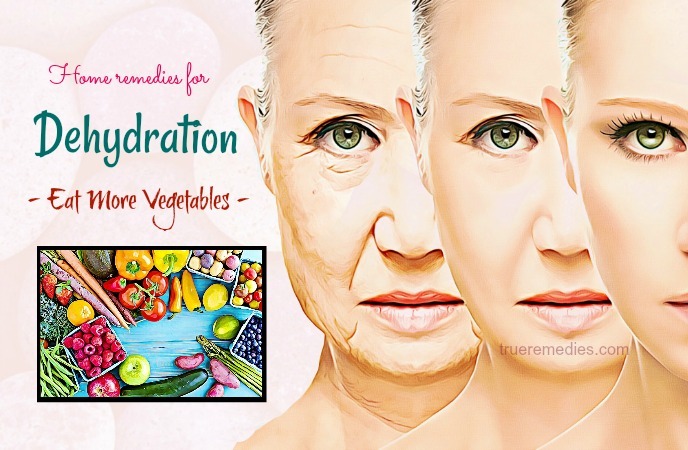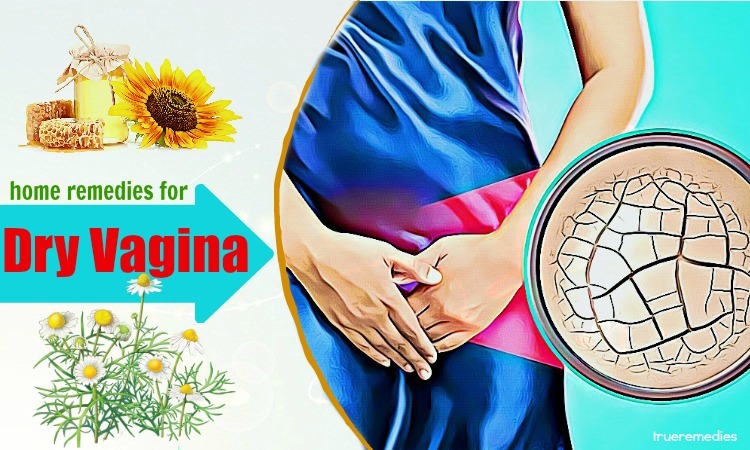Updated: 08/09/2019
CONTENTS
Water is a vital part of human life. It plays a significant role in ensuring the health and wellness of the body. If the human body is lack of water or dehydrated, it causes many adverse health effects. Dehydration occurs when the body does not have sufficient fluids to function correctly. In this case, the application of water retention measures is essential and needs to be done as soon as possible.
By statistics, many people with dehydration are unaware of their problem, or they may know their condition, but they do not know how to handle it. This causes many unfortunate consequences. That is the reason why we are preparing this article to reveal you some necessary information about dehydration and easy-to-follow remedies to keep this issue under control. Let’s have a look at this article to know what the best home remedies for dehydration are and how to apply them at home!
What Is Dehydration?
Dehydration is a condition in which the total body water level is decreased due to either less fluid intake or more fluid loss[1]. This imbalance disrupts the levels of salt, minerals, and blood sugar in the body and interferes with the normal body functions. In such a case, you need to carry out some measures re-balance the water level in your body. So, why is water retention necessary? To answer this question, we need to understand the role of water in the body.
In the human body, there is always a strict management system of water concentration to prevent dehydration and ensure the existence of the living body. As you know, water is an integral part of the body. About 73% of the human brain and heart is water. Water accounts for 60% of the human body and plays a critical role in ensuring it functions[2]. Drinking 8 to 10 cups of water a day will help your body work up to 30% more efficiently.
What Are The Roles Of Water In Maintaining A Healthy Body?
The human body cannot lack water. Without water, we will die for a few days. The body cannot work without water like a car cannot run without gasoline. The following are some essential roles of water and consequences we may encounter if the body is dehydrated.
TrueRemedies Partner Solutions

Need a Help from the Leading Expert Online, Available 24/7?
They’re all here and ready to answer your questions online or by phone. Keep asking questions until you get the answer you need.
- Water Acts As A Lubricant
Water acts as a lubricant in almost all processes of the body[3]. All human cells and organs depend on water for their activities. Water in the saliva facilitates foods to slide down the esophagus easily. It also lubricates joints and cartilage, allowing them to move smoothly. When being dehydrated, the joints and cartilage are not lubricated, leading to knee pain, back pain, or arthritis.
- Water Regulates Body Temperature
The body controls temperature through sweat glands in the skin. When it is hot, water in sweat glands will evaporate and produce a cooling effect. Blood is also transferred to the area near the lower surface of the skin, where it may be cooled, and then returned to other body parts. When it is cold, water will maintain the body temperature at an appropriate level. If dehydration occurs, there is not enough water to regulate body heat. This may lead to sickness like dizziness, heat shock, vomiting, and fainting[4].
- Water Removes Toxins From The Body
Water helps the body eliminate toxins in a variety of ways. Typically, toxins are removed through urination and sweating. When we urinate, water helps to ensure that toxins and waste products are excreted out quickly before it harms the body[5]. When the body is dehydrated, toxins are not entirely excreted out. They accumulate in the body and cause illnesses.
- Water Transports Valuable Nutrients In The Body
The concentration of water in the blood is about 83%, and it helps carry nutrients and oxygen throughout the body[6]. Nutrients from foods we eat are broken down in the digestive tract and dissolved in water. Water allows nutrients to pass through capillaries in the intestinal wall into the blood and circulatory system, where nutrients and oxygen will be distributed throughout the body. Therefore, if dehydration occurs, this process will be ineffective, causing nutritional deficiencies.
What Are Common Causes Of Dehydration?
Here are common causes of dehydration that you need to know:
- Not Providing Enough Water For The Body
Not drinking enough water because you are sick or you are too busy may cause your body to become dehydrated.
- Diabetes
People with diabetes usually have high blood sugar levels. To lower sugar levels in the body, they often urinate a lot, which may cause dehydration[7].
- Menstrual Period
During menstruation, changes in hormones (such as estrogen and progesterone) in women may affect the water level in the body. In particular, if the menstrual period lasts too long, the level of fluid in the body may be exhausted.
- Diarrhea And Vomiting
If diarrhea occurs suddenly and violently, it may cause a significant loss of water[1]. If this condition is accompanied with vomiting, dehydration is more likely to happen.
- Sweating Too Much
Hot and humid weather increases sweating; thereby, increasing the risk of dehydration. Besides, participating in intense activities may cause the body to sweat too much, causing dehydration.
- The Use Of Certain Drugs
Many drugs stimulate urination, causing you to be dehydrated. Also, many medications have side effects that cause diarrhea or vomiting, causing the body to lose water.
- Pregnancy
During pregnancy, your body needs lots of water[8]. As the amount of blood in the body increases to supply the heart and the fetus, the body demands higher fluid levels. Also, pregnant women often suffer from nausea, dehydration is likely to occur.
- Diet
Many natural foods have diuretic effects, such as parsley, dandelion, watercress, etc. When you eat these foods, you may urinate a lot. This may increase the risk of dehydration.
What Are Symptoms Of Dehydration?
Some common signs and symptoms of dehydration are:
- Feeling thirsty and dry mouth
- Dizziness
- Decrease in urination, thick or dark yellow urine
- Fatigue and weak muscle
- Dry skin
Who Is At High Risk Of Dehydration?
Dehydration is a widespread condition, and it affects people of all ages. People with diarrhea are most likely to suffer from dehydration. However, in any case, not getting enough water may cause you to face the problem of dehydration.
When To See A Doctor?
Dehydration may be extremely dangerous if not treated on time. You should see a doctor immediately if you are in the following cases:
- High fever
- Diarrhea more than two days
- Drowsiness, reduced awareness
- Fainting
- Chest pain or abdominal pain
There, you have discovered some information about dehydration. To avoid or improve the dehydration problem, the most important thing is to drink enough water. You can also apply home remedies for dehydration introduced following to better hydrate your body.
7 Effective Home Remedies For Dehydration In Babies And Adults
1. Drink Enough Water
Drinking enough water is one of the most effective treatments for dehydration. It is imperative to drink enough water every day, but how much water is enough?[9] This is undoubtedly still a question of many people. The answer is that there is no certain answer for this question. The amount of water intake should be based on gender, age, health condition, weather, and even the amount of lost water. The calculation of lost water is relatively simple. Before doing activities that may cause a lot of sweating, such as going out in the hot weather, exercising, or doing heavy work, weigh your body. Once you have returned home, re-weigh your body. The weight that is reduced is the amount of water you have just lost.
If you lose a lot of water, do not drink too much at the same time. Instead, add water every 15 minutes until you have enough water for your body. In the summer, drink at least 12 to 15 glasses of water a day to get the best health condition. Also, you can carry a bottle of water everywhere you go. You should not drink too hot or too cold water. The recommended water temperature is 10-30 degrees Celsius. Drink water as slowly as possible. Drinking a lot of water in a short time may dilute the blood, increasing the burden on the heart. It may be dangerous to your health if you have recently been exercising, running, or working hard.
If you do not like drinking fresh water, try adding a slice of lemon juice. If you are preparing for exercise, make sure you drink water before, during, and after working out. Get started and finish your day with a glass of water. When you feel hungry, drink water as soon as possible. Feeling thirsty is sometimes mistaken for feeling hungry[10]. Drinking water is also an excellent way to lose weight[11a] [11b] because it will make you feel full. If you have trouble remembering to drink water, build a schedule for this habit. For example, you can drink water when you wake up, during breakfast, lunch, dinner, and bedtime, or drink a glass of water every hour.
2. Drink Juice And Milk
This is another must-try home treatment in the list of home remedies for dehydration. Fruit juices, milk, or soy milk will naturally be more attractive than pure water. Therefore, you can drink juice or milk to no longer feel bored, while stimulating taste. This makes you drink more, thereby increasing the amount of water supplied to the body, especially in children[12a] [12b]. However, you should not abuse these drinks. Fresh water should always be the preferred choice.
3. Drink Mocktail
Reduce the heat of the summer with a mocktail. It will help you quench your thirst. Mocktail makes the drink delighted by the sweet combination of drinks and fresh fruits. This is also a way to add more water to your body. In mocktail, there is no alcohol (usually fresh fruit, milk, tea, coffee, eggs or other canned or bottled drinks such as lemon soda). This is the difference between mocktail and cocktail. Remember that all non-alcoholic drinks are wonderful for hydration[13], so why don’t you try a cup of tasty mocktail every day to keep your body hydrated.
4. Take Enough Vitamins
Drinking water sometimes is not enough to keep your body hydrated all the time. You still need to take more vitamins and minerals to maintain the hydration of your body[14]. In the summer, consume a smoothie with delicious fruits, such as a glass of mango with yogurt and a little honey is ideal to both satisfy the thirst and hydrate the body.
5. Eat More Fruits
You can add more water to your body by eating fruits such as:
- Watermelon: Watermelon may help to increase the amount of water in the body as 92% of watermelon’s composition is water[15].
- Orange: An orange contains about 90% of water. Quickly, orange may reduce your thirst and is a proper hydration fruit.
- Cucumber: Does not contain too much nutrients, cucumber contains some fiber and lots of water (approximately 96%)[16]. It is an excellent fruit to reduce thirst. You can eat single cucumber pieces or cucumber salad. Cucumber will also make your meal more and more attractive.
- Pineapple: Fresh pineapple is the food of the summer. You can add pineapple to salad or smoothie. About 85% of a pineapple is water, so you should eat pineapple daily to protect the body from dehydration.
- Apple: Apples are one of the best and most nutritious fruits. You can eat apples at any time. Apples contain about 85% water. This kind of fruit has a distinct flavor and texture and is one of the foods you should eat daily.
- Besides, these fruits are very rich in vitamin C, which may help to keep the skin moisture.
6. Eat More Vegetables
This is reckoned one of the best home remedies for dehydration. Increase the number of vegetables in your family’s daily diet. Green veggies will supply your body with water naturally. Also, vegetables provide moisture for the skin and beautify it. Here are some suggestions for you:
- Radish: 95% of radish is water[17]; it also includes a lot of nutrients. You can cut a radish into thin slices, add salt and chili, or add radish to salads with lemon juice, olive oil, and salt, and then enjoy
- Tomato: The composition of tomatoes is mainly water (94%). They also have anti-cancer properties[18] along with vitamin C, flavonoid, folate, and potassium. Sliced or chopped tomatoes are always the main ingredient of salads, sauces, and bread. According to nutrition experts, eating tomatoes helps to keep water in the body efficiently.
- Celery: Water content in celery is about 95.4%. Like other water-based foods, celery has very little calories (only 6 calories in each plant). Besides, celery is rich in folate, vitamins A, C, and K, and antioxidants[19].
- Cauliflower: Water content in cauliflowers is 92.1%. In addition, cauliflowers are good sources of vitamins and nutrients[20] that have been proven to lower cholesterol levels.
- Salads: Salads help you feel cool and prevent dehydration. A raw salad dish (which can be refrigerated) will help the body maintain a stable temperature. Mixing vegetables such as lettuce, tomato, cauliflower, cucumber, etc. will create a “cool rain” cooling your body in this hot summer.
7. Drink Electrolytes
The next one in the list of home remedies for dehydration is drinking electrolytes. Most of the electrolytes in the human body are: Sodium (Na +), potassium (K +), calcium (Ca ++), magnesium (Mg ++), Chloride (Cl-), phosphate (HPO4-), and bicarbonate (HCO3-). Each substance plays a separate role, but they are primarily responsible for maintaining the fluid balance between intracellular and extracellular environments. This balance is important for body functions such as nerve impulse transmission, muscle contraction, hydration, or pH balance.
Electrolytes help reduce body temperature and prevent dehydration. If you work or exercise regularly, remember to bring your own electrolyte drinks. They compensate for the amount of water loss for your body, thereby rapidly regulating the body temperature, helping to transport nutrients, minerals and oxygen to cells[21], protecting tissues, reducing the burden on the body’s internal organs, and most importantly maintaining and improving health.
Hydrating your body is not tricky with the help of the above mentioned home remedies for dehydration. Choose some of them and alternate them in your treatment to see how effective they are. If you have any contributing ideas to our article, do not hesitate to drop your words below this post. We will answer as soon as we could.

